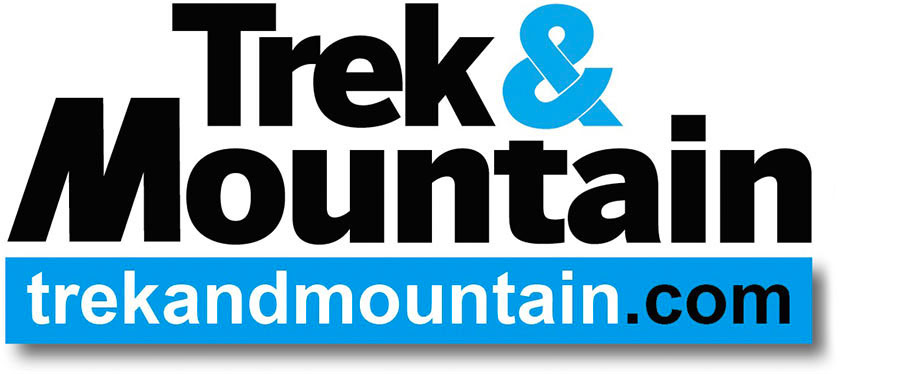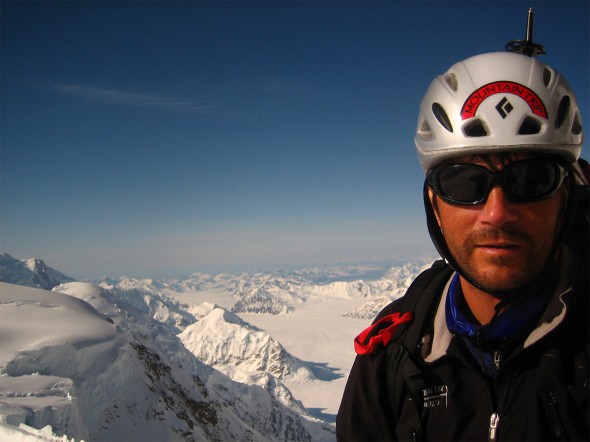Alaska’s Mt Denali is the cover star of the latest issue of Trek & Mountain mag, but aside from the fantastic and challenging climbing to be found on North America’s highest peak, there’s been ongoing debate and controversy about how climber numbers are managed on the mountain, and who is allowed permits.
The number of climbers on Denali has been limited since 2006, however the only management tool the Park Service has at their disposal to restrict use is a concession system where designated guiding companies only are allowed to lead ‘commercial’ parties on the mountain. However these are intended to make up only 25% of the climber numbers on the mountain, with the majority being independent. But the line between ‘commercial’ and ‘independent’ is a very blurry one. Many so-called independent parties often use private guides themselves without declaring it to the park authorities. Yet if private guides coming in from outside the area want to guide legally, they are required to go through one of the concessionaires which themselves are limited by the number of permits they are allowed.
Mountain Trip are one of the designated concessionaires, and owner and guide Todd Rutledge feels that the current system is in need of reform: “I feel that concessionaires have a much higher vested interest in taking greater care of the local environment than would a guide who might only visit the mountain once. I also feel that guiding Denali requires a much different skill set than most other climbs and expeditions, and the more time a guide spends on Denali, the better service and richer experience that guide can provide to clients.”
“In about 2004, some concessionaires lobbied the NPS to allow us to send a “liaison guide” on an expedition in a capacity that would not affect our allocated use. This was granted, and we were able to add such a guide to a team, thereby enabling us to allow teams from other countries to climb with their guide, under the auspices of our guides. This is an imperfect solution because those guides who wish to work on Denali must still work with a concession holder. Some concessionaires are more willing to work with foreign or independent guides than are others. Unfortunately for those guides, the current limitations on commercial use do not give concessionaires much ability to work with them, as the demand on concessionaires is more than they are currently able to meet. Allocated spots for Denali clients are very much a finite resource and if a concessionaire is filling all of their allocated use, there is not much incentive to give price breaks to other guides. This ultimately affects the clients, who much choose to either pay extra to climb with “their” guide or join a concessionaire’s expedition with guides they do not know.”
It seems that the park authorities do attempt to ensure that ‘independent’ teams are in fact not guided, however this is almost impossible to police. For example, when Trek & Mountain writer (and Mountain Leader) Jon Gupta climbed Denali with a friend on a personal expedition, the authorities initially refused to believe that he wasn’t actually guiding a client: “they checked up on me by Googling my name, and found my website, which obviously shows my guiding services,” says Jon. “It was only after a long argument that they eventually accepted that I wasn’t guiding on Denali, but here on a personal exped.”
Therein lies another of the problems with the current system, which is that guides also climb for their own enjoyment, and how can the authorities really distinguish between a non-concessionaire guide who is guiding on Denali (without admitting it) and one is who is climbing for pleasure with friends?
But Todd Rutledge explains how the problems are even more complex than this: “The big debate here is whether a guided climber should have any more or less of a right to access public lands in the style of their choice (guided), than should an independent climber. The NPS feels that independent climbers are having an experience that is more self-reliant, and therefore more aligned with the goals of the 1964 Wilderness Act, which provides the basis for how the NPS manages Denali. The entire argument is very nuanced, however the interpretation on the behalf of the current Denali NP administration is based almost entirely on their personal judgments of what is ‘wilderness’, not on the wording contained in the Wilderness Act. The precedent such an interpretation sets could have far-reaching consequences across public lands in the US.”
The debate is sure to rage on, but what does all this mean for climbers from outside the US wishing to climb on Denali? Well for independent expeditions, provided you can prove you’re not a moonlighting guide(!), there should be no reason you can’t get permits. For those wanting to be guided, the situation is that you must either go directly through one of the concessionaires on Denali, such as Mountain Trip, or book with a non-concessionaire company (which includes all exped companies outside of the US) who are also required to work with a local concessionaire. Because of this the cost of booking with such a company is likely to be higher, and dates less available, so our advice is to go straight to the people who know the mountan the best!
RELATED LINKS
www.mountaintrip.com


